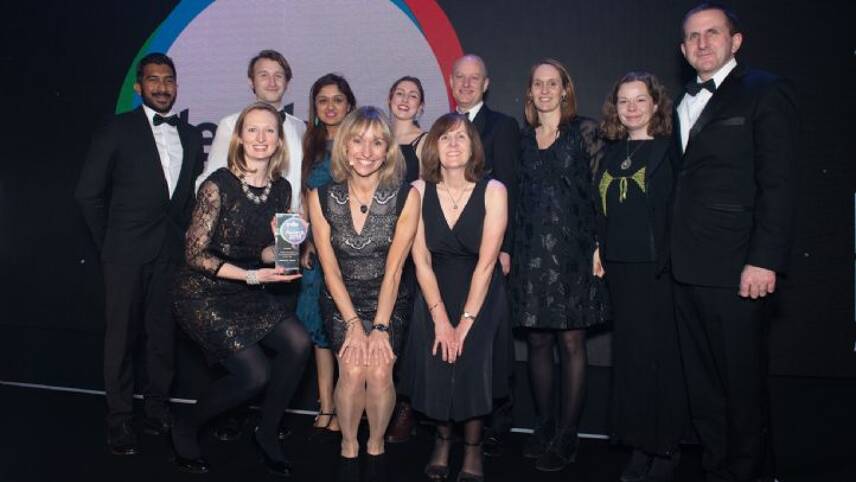Register for free and continue reading
Join our growing army of changemakers and get unlimited access to our premium content

(L-R) Presenter Ishan Perera
The Government’s contentious decision to approve the third runway at Heathrow tasks the airport with delivering a transport hub the UK needs to compete in the world. Concerns over the environmental impact of this expansion have been met by Heathrow 2.0, a sustainability strategy that engages with every aspect and team member at Heathrow Airport.
Launched in 2017, Heathrow 2.0 commits Heathrow to ensuring that, as the organisation thrives, so too will its people, communities, local environment and our world. Spearheaded by the firm’s chief executive John Holland-Kaye, who believes that sustainable growth is of critical importance to business success, the new strategy will see Heathrow address environmental concerns while igniting new approaches to sustainable business within the sector.
The strategy has been aligned with the Sustainable Development Goals (SDGs), with the 2017 sustainability report detailing how Heathrow 2.0 can directly support 14 of the 17 Goals. Heathrow has also set science-based targets for its operation’s carbon emissions up to 2050 and is developing targets for scope 3 (indirect) emissions including the supply chain.
Since 2017, the strategy has driven accelerated transformation within the organisation. Heathrow is now powered by 100% renewable electricity and since June 2018, Terminal 2 has been 100% renewably powered, with green gas supplementing energy from a biomass boiler. The organisation has committed to recovering all its 13.5 million recyclable cups this year, to reduce single-use plastics. In 2017, Heathrow worked with airlines to increase the waste recycled from cabins – a notoriously difficult task – by 4%.
Elsewhere, Heathrow has already exceeded a target of converting 50 vehicles to electric or plug-in hybrids, meaning it now operates the second largest electric corporate fleet in the UK. In fact, Heathrow has the highest density of electric vehicle (EV) charging infrastructure in Europe, thanks to the £5m it has invested in this space.
Other notable achievements driven by the 2.0 strategy are becoming Living Wage-accredited, training 100 colleagues to lead sustainable growth through a leadership development programme and reducing late-running flights by 30% compared to 2016 – a welcome improvement for nearby communities.
Heathrow has also launched a Centre of Excellence, which uses applied research and demonstration projects to bring to fruition radical new ideas and innovation across every aspect of sustainability in aviation. The Centre was accompanied by a £20,000 innovation prize, which has been awarded to Energy Crop Solutions. The company will now use the airport as a test-bed to explore how willow varieties can provide acoustic, air quality and aesthetic improvements.
Delivery of Heathrow 2.0 is supported by an accounting tool to quantify sustainability benefits and performance is reviewed monthly by a team of directors and reported to the board quarterly. Delivery has also been devolved internally to departments and tracked through Sustainability Improvement Plans. The sustainability team supports departments on delivery, with the completion of objectives linked to bonuses. By the end of 2018, all senior managers had completed a sustainability leadership programme, which has continued into 2019 for management colleagues. Sustainability is also integrated into Heathrow’s graduate programme, enabling new workers and future leaders to develop skills to deliver sustainable growth.
While operational improvements over the past two years have pushed Heathrow into the vanguard of sustainability leadership, some changes – notably the runway – will be contentious, so Heathrow is taking steps to reduce noise and offset emissions. Concrete will be the biggest source of carbon from the construction of the new runway. In response, Heathrow has commissioned studies into low/zero impact options which could influence the sourcing of one million cubic metres of alternatives.
Flights are also a huge climate issue for aviation. Heathrow is a founder member of Sustainable Aviation, which has created a carbon roadmap of how more efficient operations, new aircraft/engine technology, and sustainable fuels will allow growth in flights to be decoupled from growth in emissions. Part of Heathrow’s aspiration is for growth in flights to be carbon neutral. Offsetting will play a key role and pilots of UK peatland restoration are already underway. Heathrow will also encourage airlines to invest in similar projects.
Achieving its goals will require Heathrow to work with the 400 organisations at the airport. The Heathrow Sustainability Partnership convenes them to develop a common agenda covering workforce skills, energy reduction and sustainable transport. Ultimately, ‘Mission Possible’ means demonstrating leadership on previously intractable issues, in this case in the aviation sector. Heathrow has emerged as a sustainability leader for its recent work; if these efforts can be matched during the expansion, it can solidify its position for years to come.
What the judges said: “Heathrow has adopted a sector-leading position on sustainability over the past couple of years, thanks to strong governance at a top level. Through it’s Heathrow 2.0 strategy, the airport has put sustainability front-and-centre of its expansion plans, and is showcasing leadership on challenges outside of its scope.”
“I am passionate about air travel but I know that there are some really big issues that come with it,” Heathrow Airport’s sustainability and environment director Matthew Gorman told edie. “Heathrow 2.0 is all about showing that we can be part of the solution.”
edie’s 2020 Sustainability Leaders Awards – last call for entries
Now entering their 13th year for 2020, the RSA-accredited Sustainability Leaders Awards are sure to be one of the biggest nights of the year in the sustainability and energy space, with some exciting new categories added to recognise excellence across the spectrum of sustainable business.
The 2020 Sustainability Leaders are now OPEN for entries. The entry deadline is Friday 27 September 2019. The Awards will then take place on the night of 5 February 2020 at the Park Plaza London, Westminster.
— ENTER THE 2020 SUSTAINABILITY LEADERS AWARDS HERE —
edie staff


Please login or Register to leave a comment.